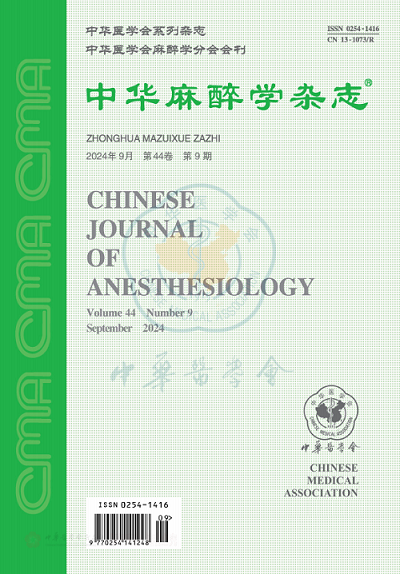Shoujun Li, Yuguang Huang, Hailong Dong, Z. Lu
{"title":"2019冠状病毒病流行期间产科麻醉建议","authors":"Shoujun Li, Yuguang Huang, Hailong Dong, Z. Lu","doi":"10.3760/CMA.J.CN131073.20200228.00305","DOIUrl":null,"url":null,"abstract":"Obstetric anesthesia is an important part of clinical anesthesia during the coronavirus disease 2019(COVID-19 )epidemic Obstetric anesthesia management faces challenges such as difficulty in evaluation, in managing patients with emergent or fluctuating conditions, and in taking care of both the mother and the fetus/newborn Obstetric anesthesia should focus on the following aspects First, detailed evaluation of COVID-19 should be carried out Except for epidemic-related evaluation, the effect of physiologic changes during pregnancy and complex condition of the parturient and critical condition on COVID-19 evaluation should be considered The possible effects of maternal lung conditions on the fetus should be paid attention to simultaneously to determine the optimal timing for delivery, delivery mode and degree of protection Second, tight infection control of the environment, staff and devices is necessary Delivery of the suspected or diagnosed cases of novel coronavirus infection should be performed in an isolation delivery room or in a negative pressure operating room Anesthetic personnel should be minimized, and skilled anesthetists should be arranged in priority Medical staff should wear personal protective equipment according to standards Third, the keypoint of optimizing anesthesia management is to maintain sufficient oxygenation and stable circulation For neuraxial anesthesia, coughing and hypotension should be minimized For general anesthesia, protection from infection during airway management is essential Fourth, humanistic care should be implemented, and psychological health education and psychological crisis intervention should be conducted for parturients Fifth, though no evidence supported the vertical transmission yet, the newborn of the suspected or diagnosed mother of novel coronavirus infection should be isolated, and breastfeeding is not permitted until the mother recover To minimize the risk of infection and optimize clinical safety, multi-discipline-based teamwork by the obstetricians, anesthetists, neonatologists, infect-control experts and intensive care unit staff on infection control and maternal-fetal management is important © 2020 Chinese Medical Association","PeriodicalId":10053,"journal":{"name":"中华麻醉学杂志","volume":"46 1","pages":"275-280"},"PeriodicalIF":0.0000,"publicationDate":"2020-03-20","publicationTypes":"Journal Article","fieldsOfStudy":null,"isOpenAccess":false,"openAccessPdf":"","citationCount":"0","resultStr":"{\"title\":\"Recommendations for obstetric anesthesia during coronavirus disease 2019 epidemic\",\"authors\":\"Shoujun Li, Yuguang Huang, Hailong Dong, Z. Lu\",\"doi\":\"10.3760/CMA.J.CN131073.20200228.00305\",\"DOIUrl\":null,\"url\":null,\"abstract\":\"Obstetric anesthesia is an important part of clinical anesthesia during the coronavirus disease 2019(COVID-19 )epidemic Obstetric anesthesia management faces challenges such as difficulty in evaluation, in managing patients with emergent or fluctuating conditions, and in taking care of both the mother and the fetus/newborn Obstetric anesthesia should focus on the following aspects First, detailed evaluation of COVID-19 should be carried out Except for epidemic-related evaluation, the effect of physiologic changes during pregnancy and complex condition of the parturient and critical condition on COVID-19 evaluation should be considered The possible effects of maternal lung conditions on the fetus should be paid attention to simultaneously to determine the optimal timing for delivery, delivery mode and degree of protection Second, tight infection control of the environment, staff and devices is necessary Delivery of the suspected or diagnosed cases of novel coronavirus infection should be performed in an isolation delivery room or in a negative pressure operating room Anesthetic personnel should be minimized, and skilled anesthetists should be arranged in priority Medical staff should wear personal protective equipment according to standards Third, the keypoint of optimizing anesthesia management is to maintain sufficient oxygenation and stable circulation For neuraxial anesthesia, coughing and hypotension should be minimized For general anesthesia, protection from infection during airway management is essential Fourth, humanistic care should be implemented, and psychological health education and psychological crisis intervention should be conducted for parturients Fifth, though no evidence supported the vertical transmission yet, the newborn of the suspected or diagnosed mother of novel coronavirus infection should be isolated, and breastfeeding is not permitted until the mother recover To minimize the risk of infection and optimize clinical safety, multi-discipline-based teamwork by the obstetricians, anesthetists, neonatologists, infect-control experts and intensive care unit staff on infection control and maternal-fetal management is important © 2020 Chinese Medical Association\",\"PeriodicalId\":10053,\"journal\":{\"name\":\"中华麻醉学杂志\",\"volume\":\"46 1\",\"pages\":\"275-280\"},\"PeriodicalIF\":0.0000,\"publicationDate\":\"2020-03-20\",\"publicationTypes\":\"Journal Article\",\"fieldsOfStudy\":null,\"isOpenAccess\":false,\"openAccessPdf\":\"\",\"citationCount\":\"0\",\"resultStr\":null,\"platform\":\"Semanticscholar\",\"paperid\":null,\"PeriodicalName\":\"中华麻醉学杂志\",\"FirstCategoryId\":\"3\",\"ListUrlMain\":\"https://doi.org/10.3760/CMA.J.CN131073.20200228.00305\",\"RegionNum\":0,\"RegionCategory\":null,\"ArticlePicture\":[],\"TitleCN\":null,\"AbstractTextCN\":null,\"PMCID\":null,\"EPubDate\":\"\",\"PubModel\":\"\",\"JCR\":\"Q4\",\"JCRName\":\"Medicine\",\"Score\":null,\"Total\":0}","platform":"Semanticscholar","paperid":null,"PeriodicalName":"中华麻醉学杂志","FirstCategoryId":"3","ListUrlMain":"https://doi.org/10.3760/CMA.J.CN131073.20200228.00305","RegionNum":0,"RegionCategory":null,"ArticlePicture":[],"TitleCN":null,"AbstractTextCN":null,"PMCID":null,"EPubDate":"","PubModel":"","JCR":"Q4","JCRName":"Medicine","Score":null,"Total":0}
引用次数: 0
Recommendations for obstetric anesthesia during coronavirus disease 2019 epidemic
Obstetric anesthesia is an important part of clinical anesthesia during the coronavirus disease 2019(COVID-19 )epidemic Obstetric anesthesia management faces challenges such as difficulty in evaluation, in managing patients with emergent or fluctuating conditions, and in taking care of both the mother and the fetus/newborn Obstetric anesthesia should focus on the following aspects First, detailed evaluation of COVID-19 should be carried out Except for epidemic-related evaluation, the effect of physiologic changes during pregnancy and complex condition of the parturient and critical condition on COVID-19 evaluation should be considered The possible effects of maternal lung conditions on the fetus should be paid attention to simultaneously to determine the optimal timing for delivery, delivery mode and degree of protection Second, tight infection control of the environment, staff and devices is necessary Delivery of the suspected or diagnosed cases of novel coronavirus infection should be performed in an isolation delivery room or in a negative pressure operating room Anesthetic personnel should be minimized, and skilled anesthetists should be arranged in priority Medical staff should wear personal protective equipment according to standards Third, the keypoint of optimizing anesthesia management is to maintain sufficient oxygenation and stable circulation For neuraxial anesthesia, coughing and hypotension should be minimized For general anesthesia, protection from infection during airway management is essential Fourth, humanistic care should be implemented, and psychological health education and psychological crisis intervention should be conducted for parturients Fifth, though no evidence supported the vertical transmission yet, the newborn of the suspected or diagnosed mother of novel coronavirus infection should be isolated, and breastfeeding is not permitted until the mother recover To minimize the risk of infection and optimize clinical safety, multi-discipline-based teamwork by the obstetricians, anesthetists, neonatologists, infect-control experts and intensive care unit staff on infection control and maternal-fetal management is important © 2020 Chinese Medical Association

 求助内容:
求助内容: 应助结果提醒方式:
应助结果提醒方式:


